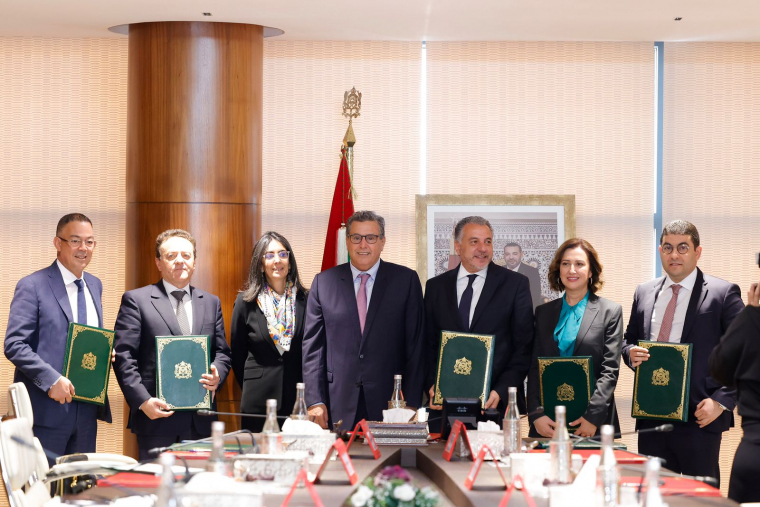The Head of Government oversees the signing of a partnership framework agreement to implement the strategic roadmap for the tourism sector by 2026

- Develop a roadmap for 2023-2026 with a budget of 6.1 billion Dirhams.
- Attracting 17.5 million tourists, creating 200,000 direct and indirect jobs, and generating 120 billion Dirhams in hard currency earnings by 2026.
The Head of Government, Mr. Aziz Akhannouch chaired, on Friday, March 17,2023,3 in Rabat, the signing ceremony of a partnership framework agreement to implement the strategic roadmap for the tourism sector, with a budget of 6.1 Billion dirhams during the period 2023-2026. In a speech on the occasion, The Head of Government, Mr. Aziz Akhannouch praised the exceptional achievement of the tourism sector during 2022 despite the difficult global context. He recalled the government's strong mobilization in favor of the sector, stressing in particular that the emergency program, for which 2 Billion dirhams were allocated, made it possible to provide support to tourism professionals and maintain jobs during the crisis. Mr. Aziz Akhannouch recalled the exceptional momentum that our country is witnessing, within the framework of the bright vision of His Majesty King Mohammed VI, may God assist him, referring to the global radiance witnessed by the Kingdom during the 2022 World Cup, and the candidacy of Morocco, along with Spain and Portugal, to organize the 2030 World Cup. For her part, Ms. Fatim-Zahra Ammor, Minister of Tourism, Handicrafts and Social and Solidarity Economy, pointed out that thanks to the comprehensive mobilization of all actors and the measures taken at the level of air transport and tourism promotion, we were able to attract about 11 million tourists in 2022, representing a recovery rate of 84% of inbound tourist traffic, compared to the limited global recovery rate of 63%. The recovery rate of tourism revenues in hard currency reached 116% compared to 2019. She added that this period of resurgence has made it possible to define the ambitious vision to double the number of tourist arrivals by 2030. The Tourism Roadmap, for which a financial envelope of approximately 6.1 Billion dirhams has been allocated over 4 years, envisages: attracting about 17.5 million tourists by 2026; 120 Billion Dirhams in hard currency income by 2026; Create 200,000 new direct and indirect jobs by 2026; Repositioning tourism as an essential sector of the national economy. To achieve these goals, the approved roadmap aims to transform the tourism sector by working on all the main levers, through:
Adopting a new vision of the tourism offer centered on the customer experience through 9 thematic and 5 horizontal series;
Developing a plan to double air transport capacity;
Enhancing the promotion and marketing with particular attention to digitalization; Diversifying the cultural and recreational revitalization products with the emergence of a fabric of active and modern SMEs;
Rehabilitating the hotels and creating new accommodation capacities;
Strengthening human capital, through an attractive framework for training and human resources management, in order to improve the quality of the sector and give better career prospects to young people.

To ensure the success of the Tourism Roadmap and its realization, new governance has been adopted through the creation of:
A national inter-ministerial committee in charge of tourism, chaired by the Head of Government, composed of the signatories to the Framework Convention;
Two national committees, the first in charge of air transport and the second on the tourism product "supply-demand";
12 committees to follow up on regional plans, under the chairmanship of the governors of the regions; A central revitalization body and regional revitalization bodies at the local level; Payment Labs as an institutional framework for public-private dialogue, made up of multidisciplinary teams. Ms. Fatim-Zahra Ammor concluded that given the importance of the tourism experience, the roadmap would bring about a qualitative and quantitative leap, ensure an exemplary experience, and enable Morocco to position itself among the world's largest tourist destinations. The framework agreement was signed by the Minister of Interior, Mr. Abdelouafi Laftit, the Minister of Tourism, Handicrafts, and Social and Solidarity Economy, Ms. Fatim-Zahra Ammor, the Minister of Transport and Logistics, Mr. Mohamed Abdeljalil, the Minister of Youth, Culture and Communication, Mr. Mohamed Mehdi Bensaid, the Minister Delegate to the Minister of Economy and Finance in charge of the budget, Mr. Fouzi Lekjaa, and Mr. Hamid Bentahar, President of the National Confederation of Tourism.







